Research Proposal: Women Entrepreneurs in Muscat Businesses
VerifiedAdded on 2019/09/18
|33
|7732
|559
Report
AI Summary
This research proposal investigates the factors affecting Omani women entrepreneurs in Muscat, Oman, and the challenges they encounter when establishing their businesses. The study focuses on barriers such as lack of family support, limited access to capital, and educational background. It includes an introduction outlining the background, problem statement, objectives, research questions, and hypotheses. A literature review explores existing research on women's entrepreneurship, gender dynamics, and the impact of family support, capital, and education. The methodology section details the research framework, design, population, instruments, data collection, and analysis methods, including ethical considerations. The proposal aims to identify strategies to overcome these barriers and improve the participation of Omani women in the business sector. The study also examines the influence of societal attitudes and the need for governmental and community support to foster a more conducive environment for women entrepreneurs in Muscat.
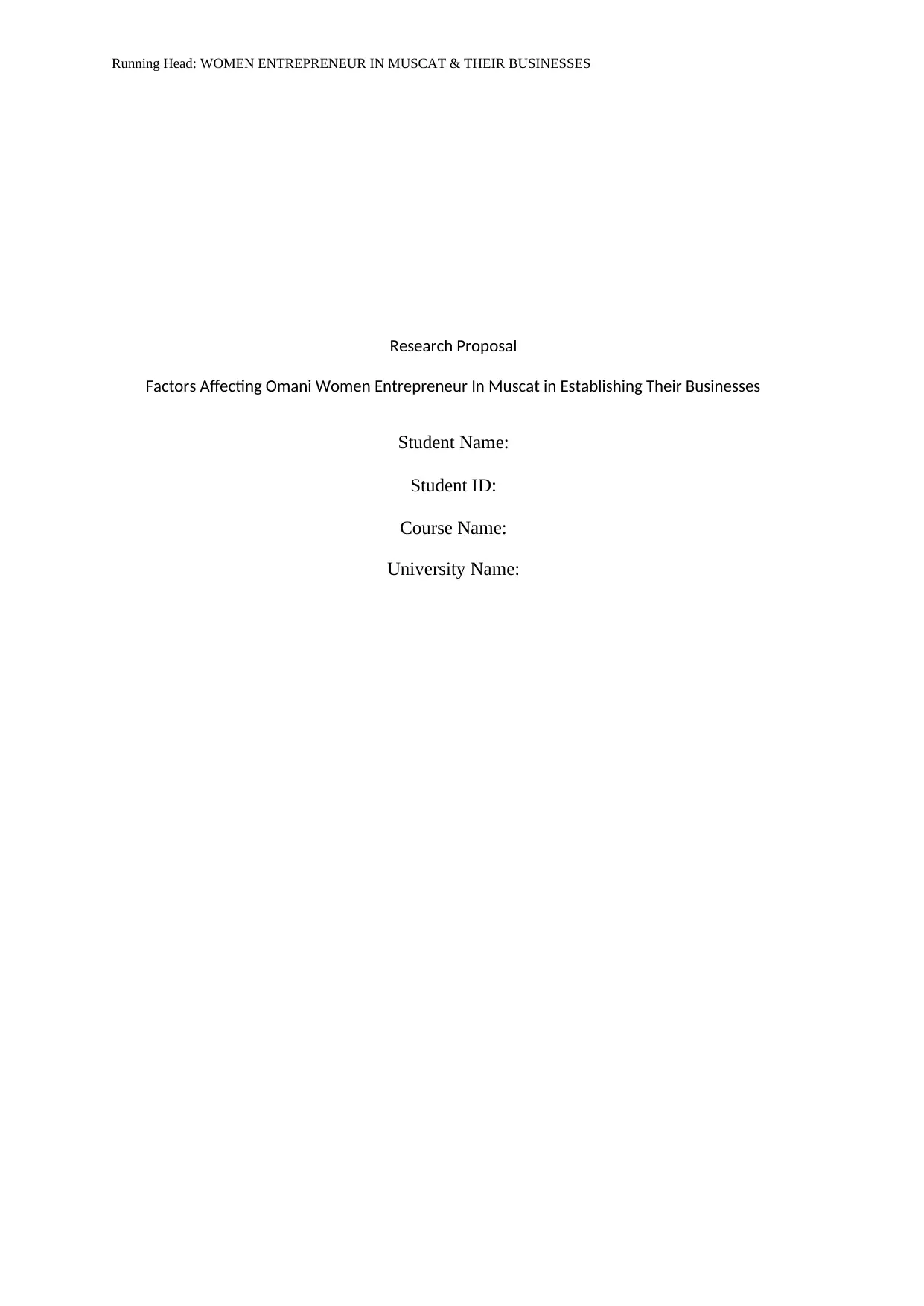
Running Head: WOMEN ENTREPRENEUR IN MUSCAT & THEIR BUSINESSES
Research Proposal
Factors Affecting Omani Women Entrepreneur In Muscat in Establishing Their Businesses
Student Name:
Student ID:
Course Name:
University Name:
Research Proposal
Factors Affecting Omani Women Entrepreneur In Muscat in Establishing Their Businesses
Student Name:
Student ID:
Course Name:
University Name:
Paraphrase This Document
Need a fresh take? Get an instant paraphrase of this document with our AI Paraphraser
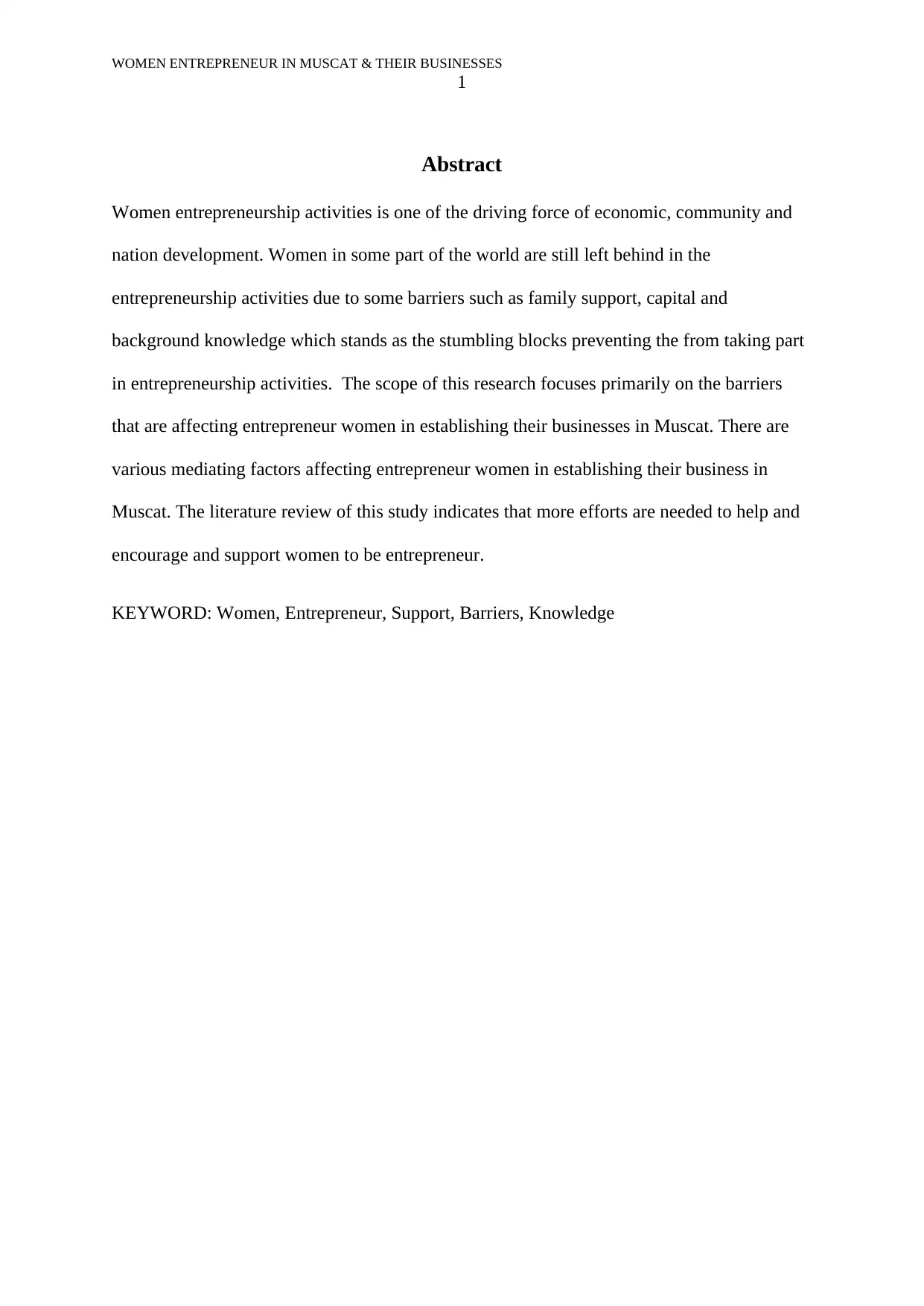
WOMEN ENTREPRENEUR IN MUSCAT & THEIR BUSINESSES
1
Abstract
Women entrepreneurship activities is one of the driving force of economic, community and
nation development. Women in some part of the world are still left behind in the
entrepreneurship activities due to some barriers such as family support, capital and
background knowledge which stands as the stumbling blocks preventing the from taking part
in entrepreneurship activities. The scope of this research focuses primarily on the barriers
that are affecting entrepreneur women in establishing their businesses in Muscat. There are
various mediating factors affecting entrepreneur women in establishing their business in
Muscat. The literature review of this study indicates that more efforts are needed to help and
encourage and support women to be entrepreneur.
KEYWORD: Women, Entrepreneur, Support, Barriers, Knowledge
1
Abstract
Women entrepreneurship activities is one of the driving force of economic, community and
nation development. Women in some part of the world are still left behind in the
entrepreneurship activities due to some barriers such as family support, capital and
background knowledge which stands as the stumbling blocks preventing the from taking part
in entrepreneurship activities. The scope of this research focuses primarily on the barriers
that are affecting entrepreneur women in establishing their businesses in Muscat. There are
various mediating factors affecting entrepreneur women in establishing their business in
Muscat. The literature review of this study indicates that more efforts are needed to help and
encourage and support women to be entrepreneur.
KEYWORD: Women, Entrepreneur, Support, Barriers, Knowledge
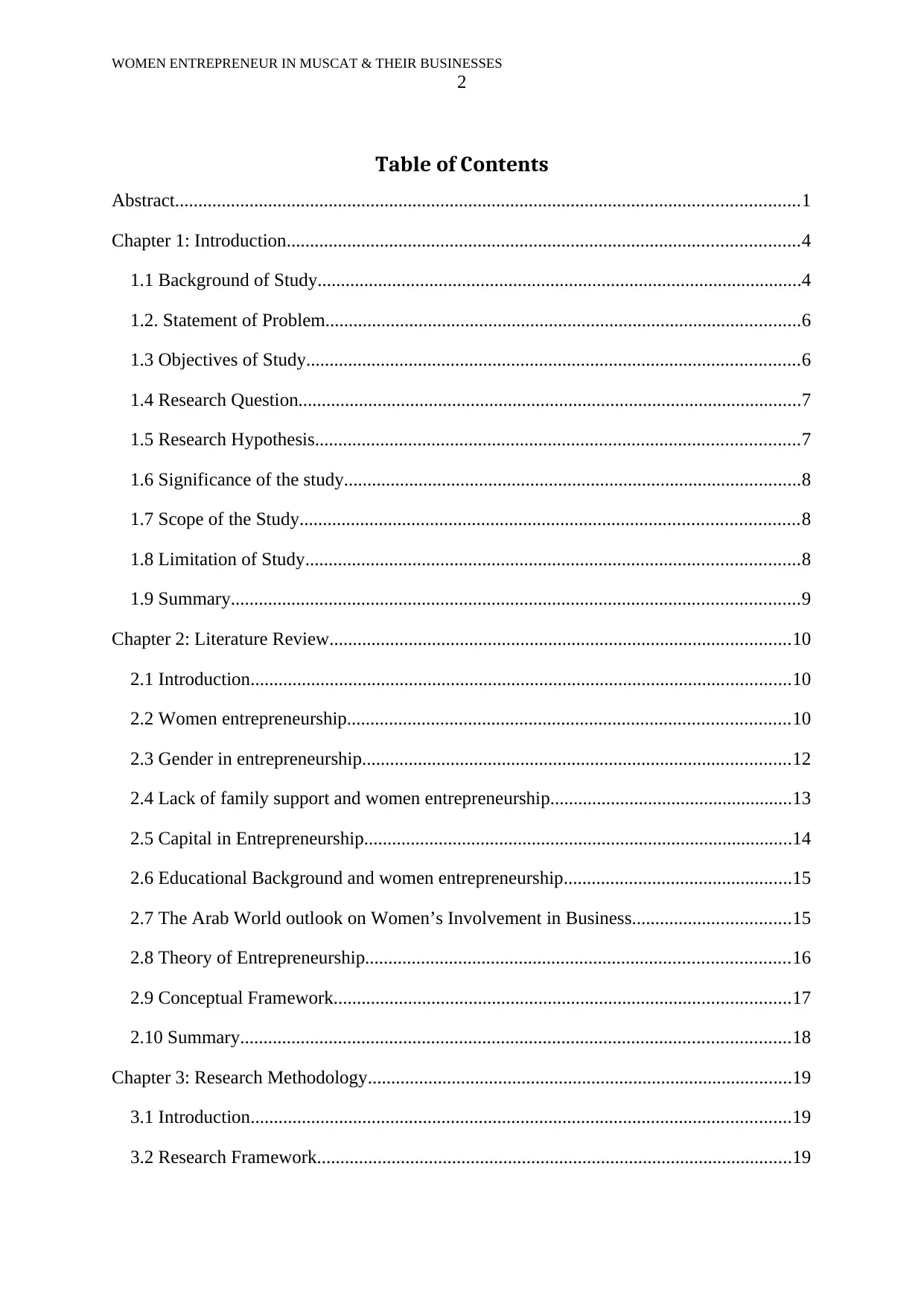
WOMEN ENTREPRENEUR IN MUSCAT & THEIR BUSINESSES
2
Table of Contents
Abstract......................................................................................................................................1
Chapter 1: Introduction..............................................................................................................4
1.1 Background of Study........................................................................................................4
1.2. Statement of Problem......................................................................................................6
1.3 Objectives of Study..........................................................................................................6
1.4 Research Question............................................................................................................7
1.5 Research Hypothesis........................................................................................................7
1.6 Significance of the study..................................................................................................8
1.7 Scope of the Study...........................................................................................................8
1.8 Limitation of Study..........................................................................................................8
1.9 Summary..........................................................................................................................9
Chapter 2: Literature Review...................................................................................................10
2.1 Introduction....................................................................................................................10
2.2 Women entrepreneurship...............................................................................................10
2.3 Gender in entrepreneurship............................................................................................12
2.4 Lack of family support and women entrepreneurship....................................................13
2.5 Capital in Entrepreneurship............................................................................................14
2.6 Educational Background and women entrepreneurship.................................................15
2.7 The Arab World outlook on Women’s Involvement in Business..................................15
2.8 Theory of Entrepreneurship...........................................................................................16
2.9 Conceptual Framework..................................................................................................17
2.10 Summary......................................................................................................................18
Chapter 3: Research Methodology...........................................................................................19
3.1 Introduction....................................................................................................................19
3.2 Research Framework......................................................................................................19
2
Table of Contents
Abstract......................................................................................................................................1
Chapter 1: Introduction..............................................................................................................4
1.1 Background of Study........................................................................................................4
1.2. Statement of Problem......................................................................................................6
1.3 Objectives of Study..........................................................................................................6
1.4 Research Question............................................................................................................7
1.5 Research Hypothesis........................................................................................................7
1.6 Significance of the study..................................................................................................8
1.7 Scope of the Study...........................................................................................................8
1.8 Limitation of Study..........................................................................................................8
1.9 Summary..........................................................................................................................9
Chapter 2: Literature Review...................................................................................................10
2.1 Introduction....................................................................................................................10
2.2 Women entrepreneurship...............................................................................................10
2.3 Gender in entrepreneurship............................................................................................12
2.4 Lack of family support and women entrepreneurship....................................................13
2.5 Capital in Entrepreneurship............................................................................................14
2.6 Educational Background and women entrepreneurship.................................................15
2.7 The Arab World outlook on Women’s Involvement in Business..................................15
2.8 Theory of Entrepreneurship...........................................................................................16
2.9 Conceptual Framework..................................................................................................17
2.10 Summary......................................................................................................................18
Chapter 3: Research Methodology...........................................................................................19
3.1 Introduction....................................................................................................................19
3.2 Research Framework......................................................................................................19
⊘ This is a preview!⊘
Do you want full access?
Subscribe today to unlock all pages.

Trusted by 1+ million students worldwide
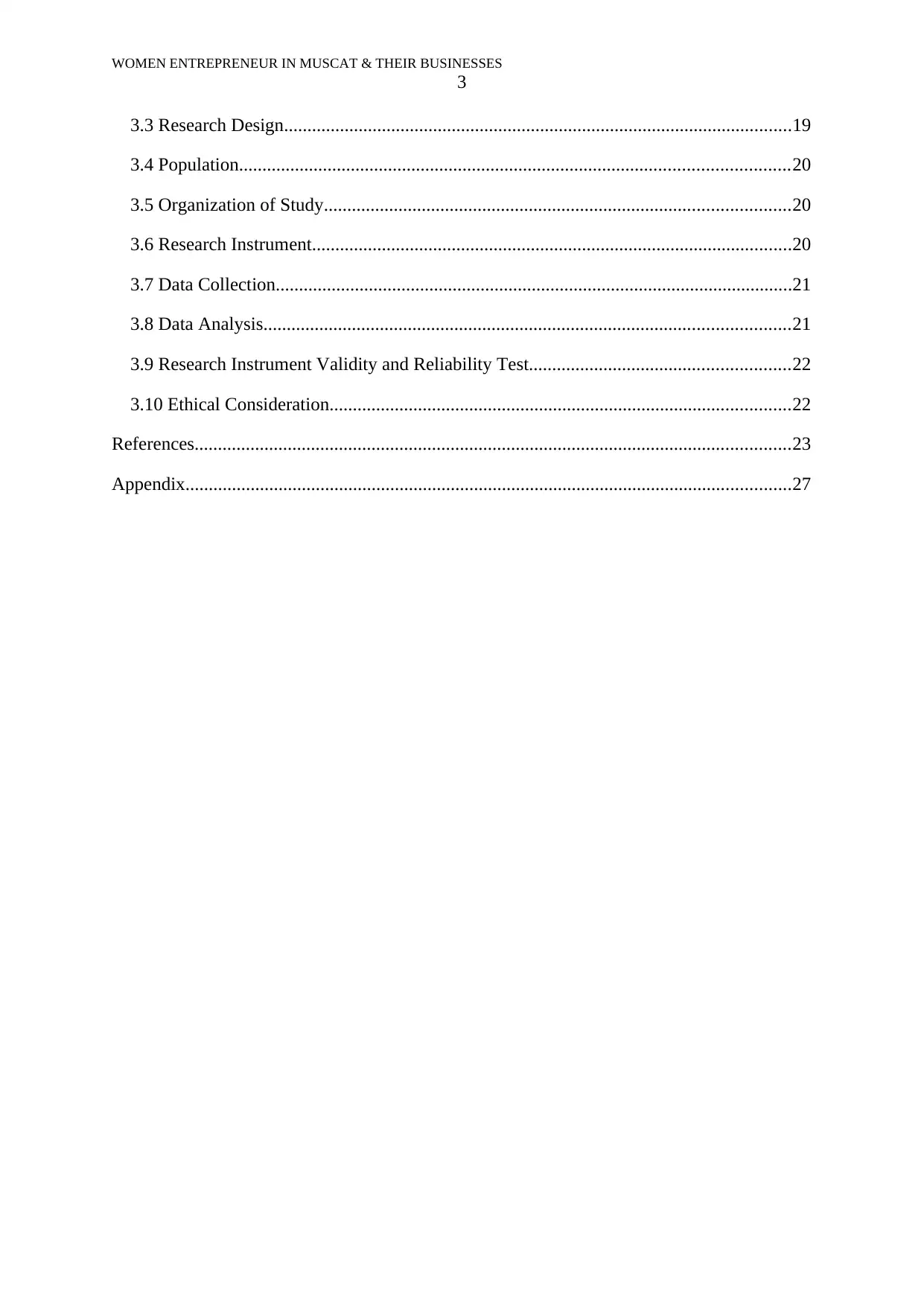
WOMEN ENTREPRENEUR IN MUSCAT & THEIR BUSINESSES
3
3.3 Research Design.............................................................................................................19
3.4 Population......................................................................................................................20
3.5 Organization of Study....................................................................................................20
3.6 Research Instrument.......................................................................................................20
3.7 Data Collection...............................................................................................................21
3.8 Data Analysis.................................................................................................................21
3.9 Research Instrument Validity and Reliability Test........................................................22
3.10 Ethical Consideration...................................................................................................22
References................................................................................................................................23
Appendix..................................................................................................................................27
3
3.3 Research Design.............................................................................................................19
3.4 Population......................................................................................................................20
3.5 Organization of Study....................................................................................................20
3.6 Research Instrument.......................................................................................................20
3.7 Data Collection...............................................................................................................21
3.8 Data Analysis.................................................................................................................21
3.9 Research Instrument Validity and Reliability Test........................................................22
3.10 Ethical Consideration...................................................................................................22
References................................................................................................................................23
Appendix..................................................................................................................................27
Paraphrase This Document
Need a fresh take? Get an instant paraphrase of this document with our AI Paraphraser
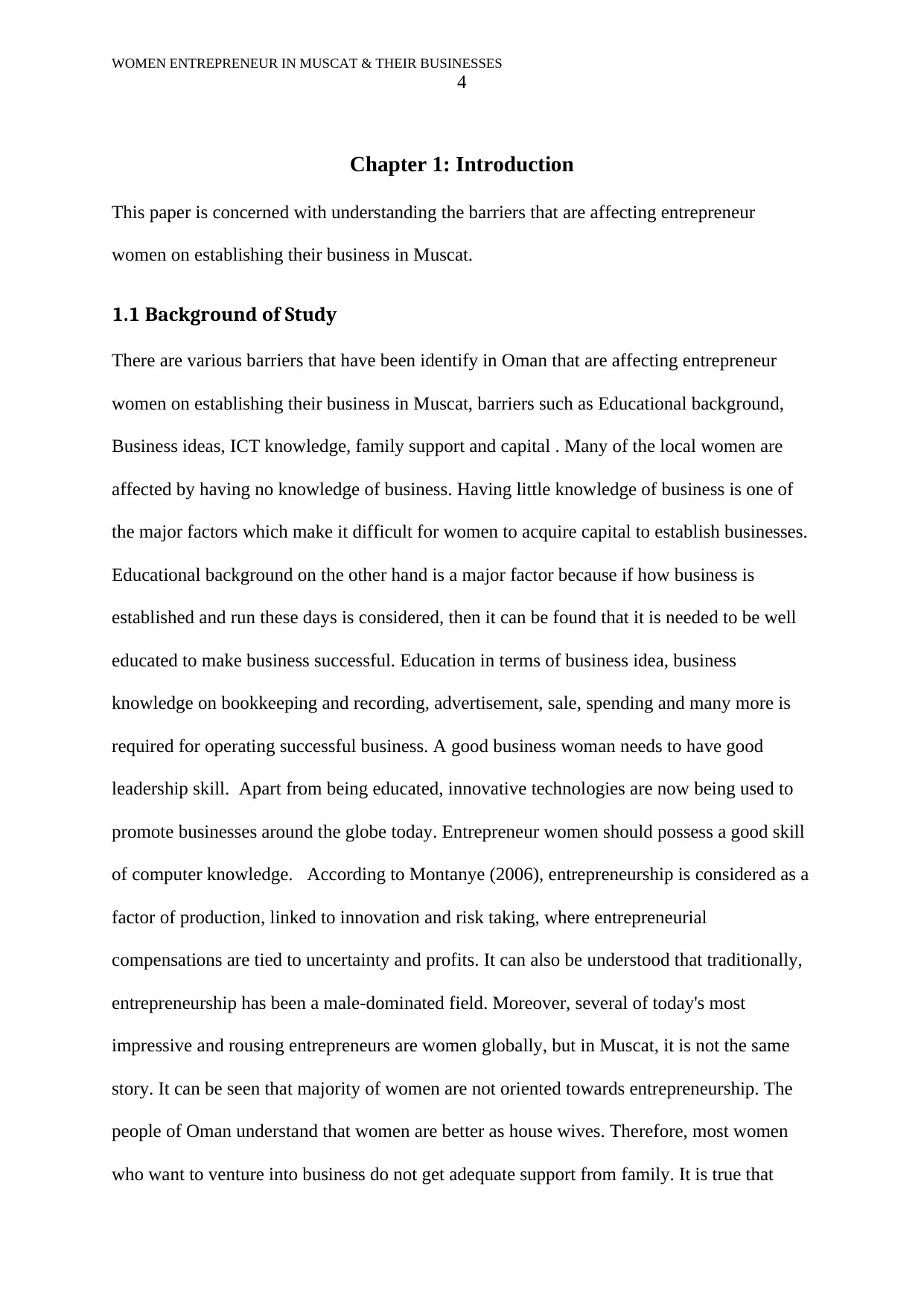
WOMEN ENTREPRENEUR IN MUSCAT & THEIR BUSINESSES
4
Chapter 1: Introduction
This paper is concerned with understanding the barriers that are affecting entrepreneur
women on establishing their business in Muscat.
1.1 Background of Study
There are various barriers that have been identify in Oman that are affecting entrepreneur
women on establishing their business in Muscat, barriers such as Educational background,
Business ideas, ICT knowledge, family support and capital . Many of the local women are
affected by having no knowledge of business. Having little knowledge of business is one of
the major factors which make it difficult for women to acquire capital to establish businesses.
Educational background on the other hand is a major factor because if how business is
established and run these days is considered, then it can be found that it is needed to be well
educated to make business successful. Education in terms of business idea, business
knowledge on bookkeeping and recording, advertisement, sale, spending and many more is
required for operating successful business. A good business woman needs to have good
leadership skill. Apart from being educated, innovative technologies are now being used to
promote businesses around the globe today. Entrepreneur women should possess a good skill
of computer knowledge. According to Montanye (2006), entrepreneurship is considered as a
factor of production, linked to innovation and risk taking, where entrepreneurial
compensations are tied to uncertainty and profits. It can also be understood that traditionally,
entrepreneurship has been a male-dominated field. Moreover, several of today's most
impressive and rousing entrepreneurs are women globally, but in Muscat, it is not the same
story. It can be seen that majority of women are not oriented towards entrepreneurship. The
people of Oman understand that women are better as house wives. Therefore, most women
who want to venture into business do not get adequate support from family. It is true that
4
Chapter 1: Introduction
This paper is concerned with understanding the barriers that are affecting entrepreneur
women on establishing their business in Muscat.
1.1 Background of Study
There are various barriers that have been identify in Oman that are affecting entrepreneur
women on establishing their business in Muscat, barriers such as Educational background,
Business ideas, ICT knowledge, family support and capital . Many of the local women are
affected by having no knowledge of business. Having little knowledge of business is one of
the major factors which make it difficult for women to acquire capital to establish businesses.
Educational background on the other hand is a major factor because if how business is
established and run these days is considered, then it can be found that it is needed to be well
educated to make business successful. Education in terms of business idea, business
knowledge on bookkeeping and recording, advertisement, sale, spending and many more is
required for operating successful business. A good business woman needs to have good
leadership skill. Apart from being educated, innovative technologies are now being used to
promote businesses around the globe today. Entrepreneur women should possess a good skill
of computer knowledge. According to Montanye (2006), entrepreneurship is considered as a
factor of production, linked to innovation and risk taking, where entrepreneurial
compensations are tied to uncertainty and profits. It can also be understood that traditionally,
entrepreneurship has been a male-dominated field. Moreover, several of today's most
impressive and rousing entrepreneurs are women globally, but in Muscat, it is not the same
story. It can be seen that majority of women are not oriented towards entrepreneurship. The
people of Oman understand that women are better as house wives. Therefore, most women
who want to venture into business do not get adequate support from family. It is true that
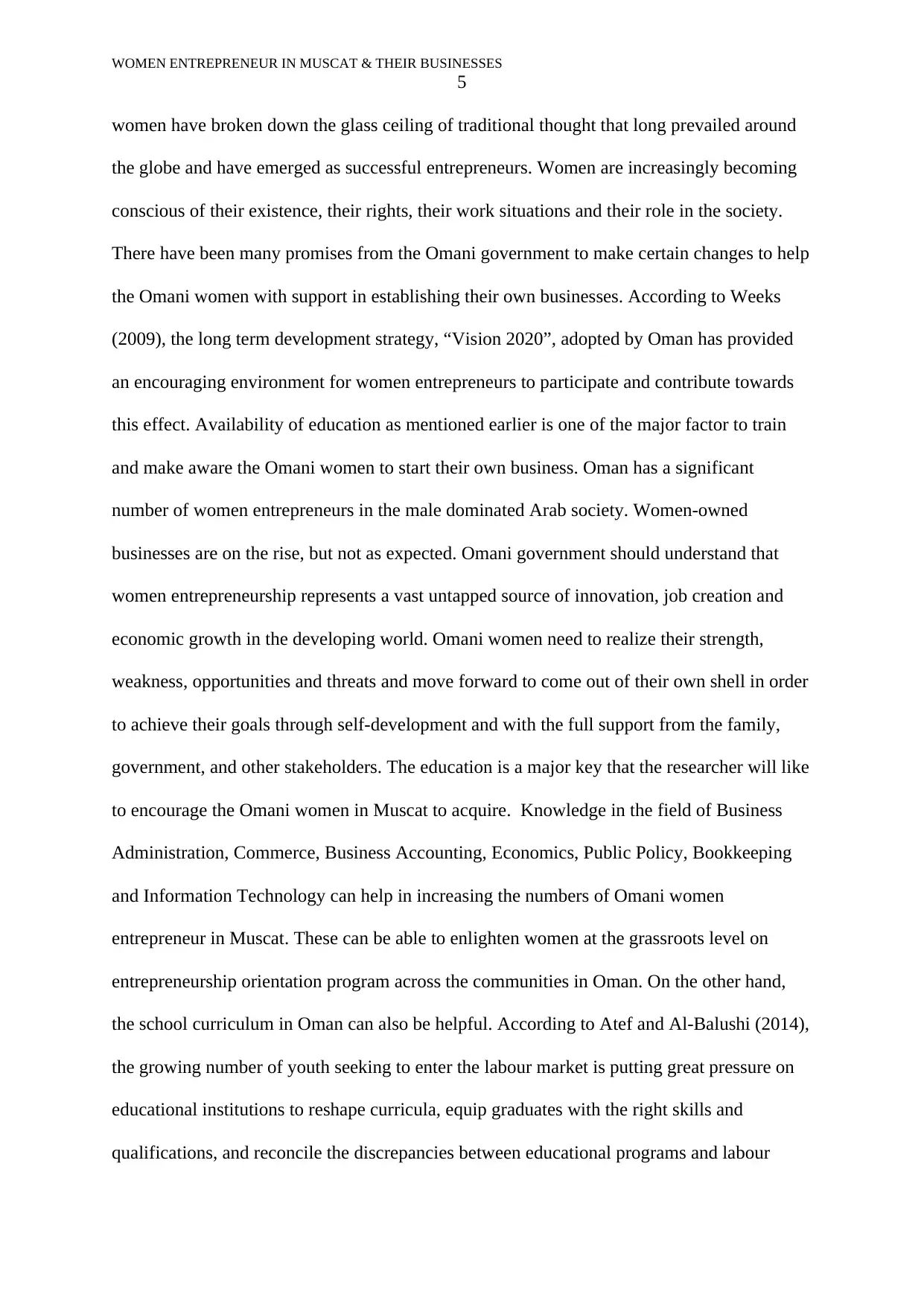
WOMEN ENTREPRENEUR IN MUSCAT & THEIR BUSINESSES
5
women have broken down the glass ceiling of traditional thought that long prevailed around
the globe and have emerged as successful entrepreneurs. Women are increasingly becoming
conscious of their existence, their rights, their work situations and their role in the society.
There have been many promises from the Omani government to make certain changes to help
the Omani women with support in establishing their own businesses. According to Weeks
(2009), the long term development strategy, “Vision 2020”, adopted by Oman has provided
an encouraging environment for women entrepreneurs to participate and contribute towards
this effect. Availability of education as mentioned earlier is one of the major factor to train
and make aware the Omani women to start their own business. Oman has a significant
number of women entrepreneurs in the male dominated Arab society. Women-owned
businesses are on the rise, but not as expected. Omani government should understand that
women entrepreneurship represents a vast untapped source of innovation, job creation and
economic growth in the developing world. Omani women need to realize their strength,
weakness, opportunities and threats and move forward to come out of their own shell in order
to achieve their goals through self-development and with the full support from the family,
government, and other stakeholders. The education is a major key that the researcher will like
to encourage the Omani women in Muscat to acquire. Knowledge in the field of Business
Administration, Commerce, Business Accounting, Economics, Public Policy, Bookkeeping
and Information Technology can help in increasing the numbers of Omani women
entrepreneur in Muscat. These can be able to enlighten women at the grassroots level on
entrepreneurship orientation program across the communities in Oman. On the other hand,
the school curriculum in Oman can also be helpful. According to Atef and Al-Balushi (2014),
the growing number of youth seeking to enter the labour market is putting great pressure on
educational institutions to reshape curricula, equip graduates with the right skills and
qualifications, and reconcile the discrepancies between educational programs and labour
5
women have broken down the glass ceiling of traditional thought that long prevailed around
the globe and have emerged as successful entrepreneurs. Women are increasingly becoming
conscious of their existence, their rights, their work situations and their role in the society.
There have been many promises from the Omani government to make certain changes to help
the Omani women with support in establishing their own businesses. According to Weeks
(2009), the long term development strategy, “Vision 2020”, adopted by Oman has provided
an encouraging environment for women entrepreneurs to participate and contribute towards
this effect. Availability of education as mentioned earlier is one of the major factor to train
and make aware the Omani women to start their own business. Oman has a significant
number of women entrepreneurs in the male dominated Arab society. Women-owned
businesses are on the rise, but not as expected. Omani government should understand that
women entrepreneurship represents a vast untapped source of innovation, job creation and
economic growth in the developing world. Omani women need to realize their strength,
weakness, opportunities and threats and move forward to come out of their own shell in order
to achieve their goals through self-development and with the full support from the family,
government, and other stakeholders. The education is a major key that the researcher will like
to encourage the Omani women in Muscat to acquire. Knowledge in the field of Business
Administration, Commerce, Business Accounting, Economics, Public Policy, Bookkeeping
and Information Technology can help in increasing the numbers of Omani women
entrepreneur in Muscat. These can be able to enlighten women at the grassroots level on
entrepreneurship orientation program across the communities in Oman. On the other hand,
the school curriculum in Oman can also be helpful. According to Atef and Al-Balushi (2014),
the growing number of youth seeking to enter the labour market is putting great pressure on
educational institutions to reshape curricula, equip graduates with the right skills and
qualifications, and reconcile the discrepancies between educational programs and labour
⊘ This is a preview!⊘
Do you want full access?
Subscribe today to unlock all pages.

Trusted by 1+ million students worldwide
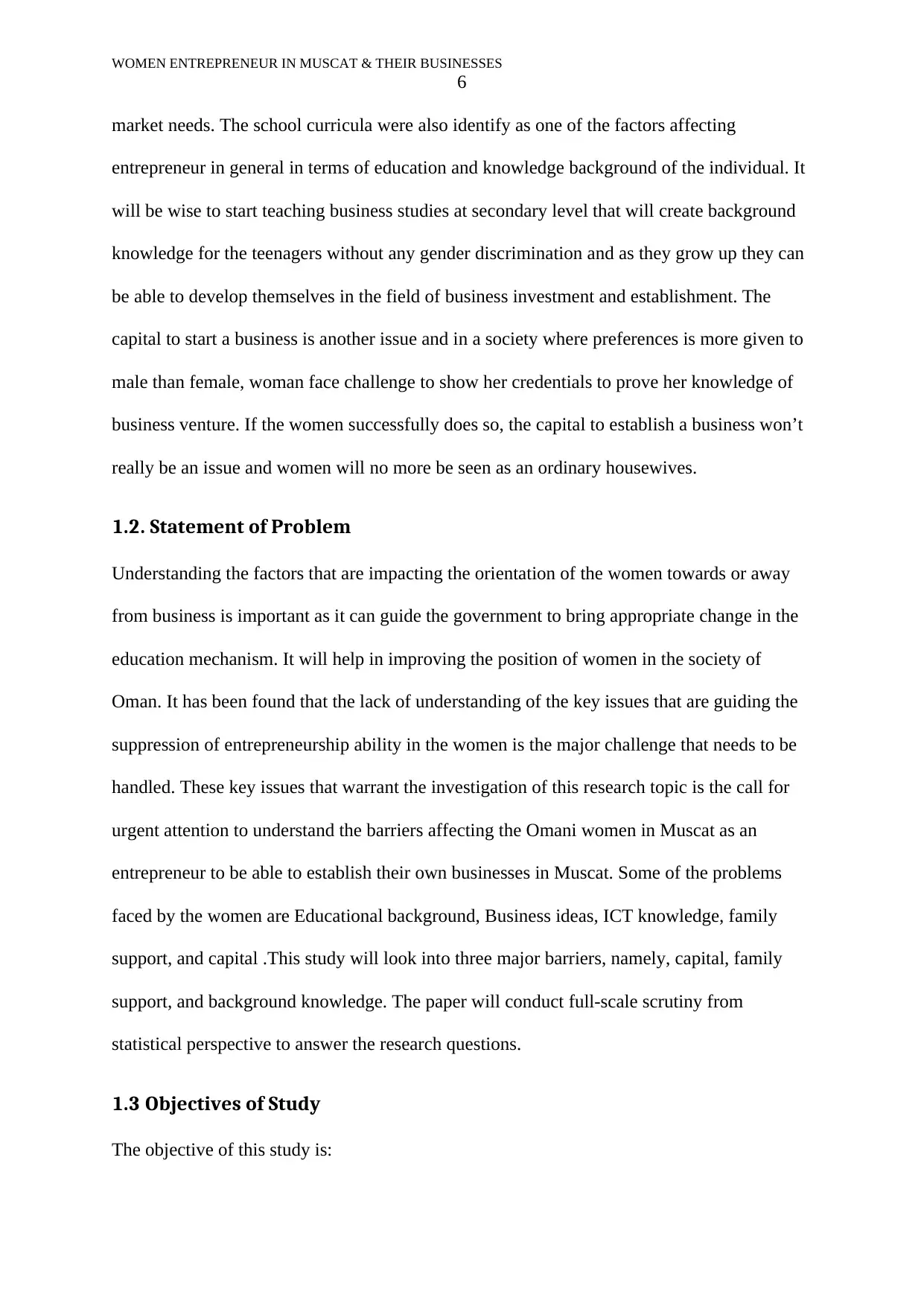
WOMEN ENTREPRENEUR IN MUSCAT & THEIR BUSINESSES
6
market needs. The school curricula were also identify as one of the factors affecting
entrepreneur in general in terms of education and knowledge background of the individual. It
will be wise to start teaching business studies at secondary level that will create background
knowledge for the teenagers without any gender discrimination and as they grow up they can
be able to develop themselves in the field of business investment and establishment. The
capital to start a business is another issue and in a society where preferences is more given to
male than female, woman face challenge to show her credentials to prove her knowledge of
business venture. If the women successfully does so, the capital to establish a business won’t
really be an issue and women will no more be seen as an ordinary housewives.
1.2. Statement of Problem
Understanding the factors that are impacting the orientation of the women towards or away
from business is important as it can guide the government to bring appropriate change in the
education mechanism. It will help in improving the position of women in the society of
Oman. It has been found that the lack of understanding of the key issues that are guiding the
suppression of entrepreneurship ability in the women is the major challenge that needs to be
handled. These key issues that warrant the investigation of this research topic is the call for
urgent attention to understand the barriers affecting the Omani women in Muscat as an
entrepreneur to be able to establish their own businesses in Muscat. Some of the problems
faced by the women are Educational background, Business ideas, ICT knowledge, family
support, and capital .This study will look into three major barriers, namely, capital, family
support, and background knowledge. The paper will conduct full-scale scrutiny from
statistical perspective to answer the research questions.
1.3 Objectives of Study
The objective of this study is:
6
market needs. The school curricula were also identify as one of the factors affecting
entrepreneur in general in terms of education and knowledge background of the individual. It
will be wise to start teaching business studies at secondary level that will create background
knowledge for the teenagers without any gender discrimination and as they grow up they can
be able to develop themselves in the field of business investment and establishment. The
capital to start a business is another issue and in a society where preferences is more given to
male than female, woman face challenge to show her credentials to prove her knowledge of
business venture. If the women successfully does so, the capital to establish a business won’t
really be an issue and women will no more be seen as an ordinary housewives.
1.2. Statement of Problem
Understanding the factors that are impacting the orientation of the women towards or away
from business is important as it can guide the government to bring appropriate change in the
education mechanism. It will help in improving the position of women in the society of
Oman. It has been found that the lack of understanding of the key issues that are guiding the
suppression of entrepreneurship ability in the women is the major challenge that needs to be
handled. These key issues that warrant the investigation of this research topic is the call for
urgent attention to understand the barriers affecting the Omani women in Muscat as an
entrepreneur to be able to establish their own businesses in Muscat. Some of the problems
faced by the women are Educational background, Business ideas, ICT knowledge, family
support, and capital .This study will look into three major barriers, namely, capital, family
support, and background knowledge. The paper will conduct full-scale scrutiny from
statistical perspective to answer the research questions.
1.3 Objectives of Study
The objective of this study is:
Paraphrase This Document
Need a fresh take? Get an instant paraphrase of this document with our AI Paraphraser
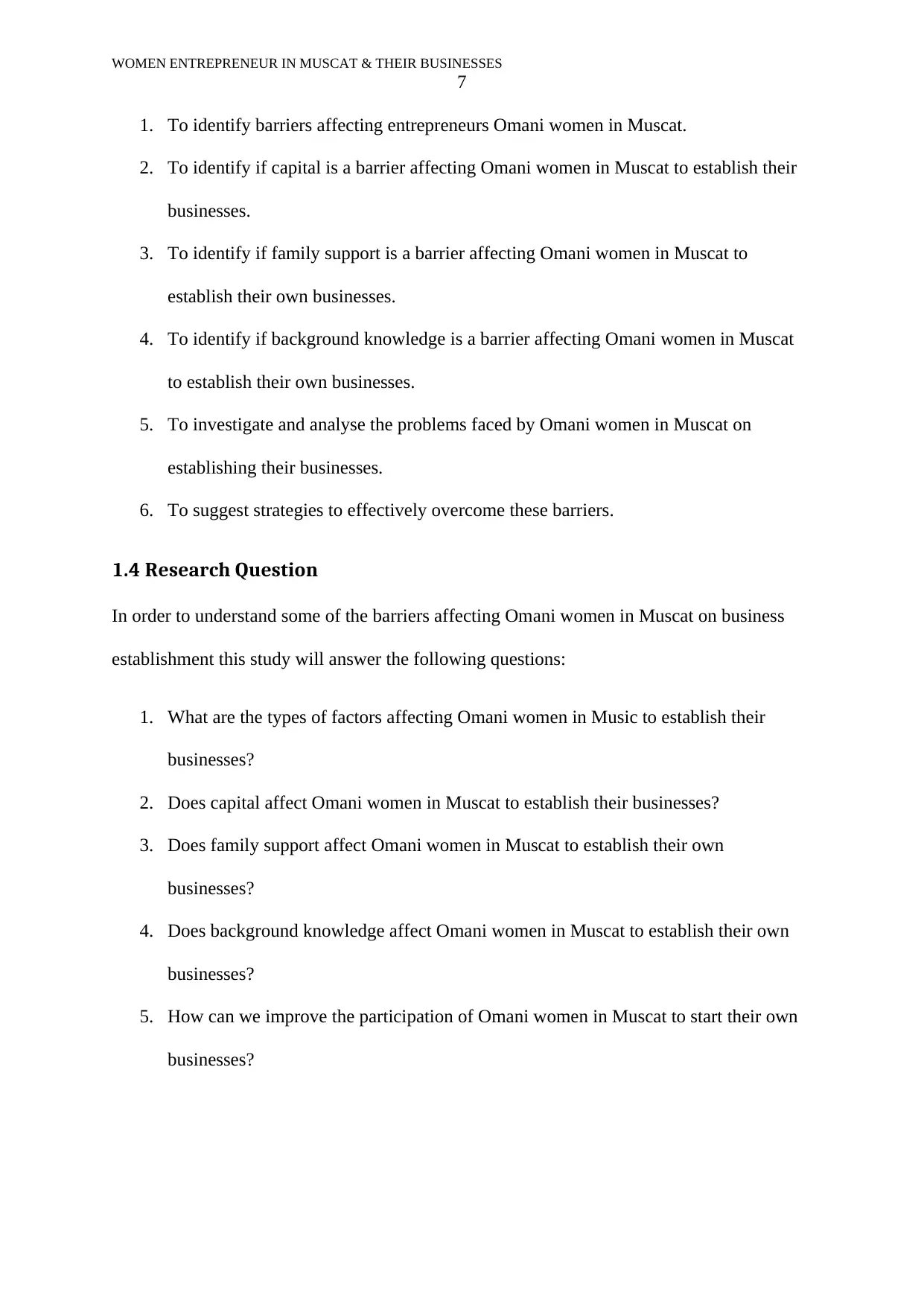
WOMEN ENTREPRENEUR IN MUSCAT & THEIR BUSINESSES
7
1. To identify barriers affecting entrepreneurs Omani women in Muscat.
2. To identify if capital is a barrier affecting Omani women in Muscat to establish their
businesses.
3. To identify if family support is a barrier affecting Omani women in Muscat to
establish their own businesses.
4. To identify if background knowledge is a barrier affecting Omani women in Muscat
to establish their own businesses.
5. To investigate and analyse the problems faced by Omani women in Muscat on
establishing their businesses.
6. To suggest strategies to effectively overcome these barriers.
1.4 Research Question
In order to understand some of the barriers affecting Omani women in Muscat on business
establishment this study will answer the following questions:
1. What are the types of factors affecting Omani women in Music to establish their
businesses?
2. Does capital affect Omani women in Muscat to establish their businesses?
3. Does family support affect Omani women in Muscat to establish their own
businesses?
4. Does background knowledge affect Omani women in Muscat to establish their own
businesses?
5. How can we improve the participation of Omani women in Muscat to start their own
businesses?
7
1. To identify barriers affecting entrepreneurs Omani women in Muscat.
2. To identify if capital is a barrier affecting Omani women in Muscat to establish their
businesses.
3. To identify if family support is a barrier affecting Omani women in Muscat to
establish their own businesses.
4. To identify if background knowledge is a barrier affecting Omani women in Muscat
to establish their own businesses.
5. To investigate and analyse the problems faced by Omani women in Muscat on
establishing their businesses.
6. To suggest strategies to effectively overcome these barriers.
1.4 Research Question
In order to understand some of the barriers affecting Omani women in Muscat on business
establishment this study will answer the following questions:
1. What are the types of factors affecting Omani women in Music to establish their
businesses?
2. Does capital affect Omani women in Muscat to establish their businesses?
3. Does family support affect Omani women in Muscat to establish their own
businesses?
4. Does background knowledge affect Omani women in Muscat to establish their own
businesses?
5. How can we improve the participation of Omani women in Muscat to start their own
businesses?
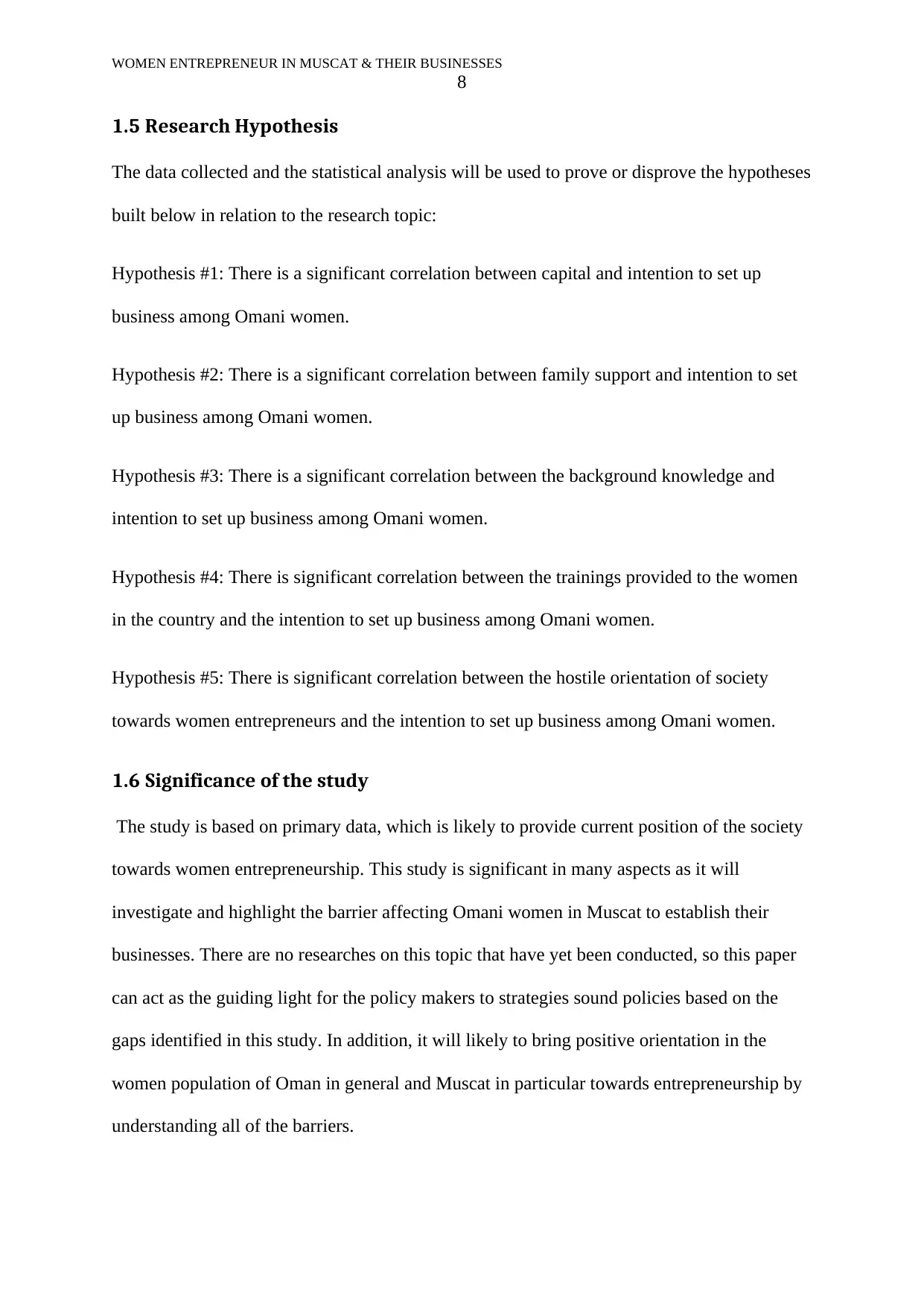
WOMEN ENTREPRENEUR IN MUSCAT & THEIR BUSINESSES
8
1.5 Research Hypothesis
The data collected and the statistical analysis will be used to prove or disprove the hypotheses
built below in relation to the research topic:
Hypothesis #1: There is a significant correlation between capital and intention to set up
business among Omani women.
Hypothesis #2: There is a significant correlation between family support and intention to set
up business among Omani women.
Hypothesis #3: There is a significant correlation between the background knowledge and
intention to set up business among Omani women.
Hypothesis #4: There is significant correlation between the trainings provided to the women
in the country and the intention to set up business among Omani women.
Hypothesis #5: There is significant correlation between the hostile orientation of society
towards women entrepreneurs and the intention to set up business among Omani women.
1.6 Significance of the study
The study is based on primary data, which is likely to provide current position of the society
towards women entrepreneurship. This study is significant in many aspects as it will
investigate and highlight the barrier affecting Omani women in Muscat to establish their
businesses. There are no researches on this topic that have yet been conducted, so this paper
can act as the guiding light for the policy makers to strategies sound policies based on the
gaps identified in this study. In addition, it will likely to bring positive orientation in the
women population of Oman in general and Muscat in particular towards entrepreneurship by
understanding all of the barriers.
8
1.5 Research Hypothesis
The data collected and the statistical analysis will be used to prove or disprove the hypotheses
built below in relation to the research topic:
Hypothesis #1: There is a significant correlation between capital and intention to set up
business among Omani women.
Hypothesis #2: There is a significant correlation between family support and intention to set
up business among Omani women.
Hypothesis #3: There is a significant correlation between the background knowledge and
intention to set up business among Omani women.
Hypothesis #4: There is significant correlation between the trainings provided to the women
in the country and the intention to set up business among Omani women.
Hypothesis #5: There is significant correlation between the hostile orientation of society
towards women entrepreneurs and the intention to set up business among Omani women.
1.6 Significance of the study
The study is based on primary data, which is likely to provide current position of the society
towards women entrepreneurship. This study is significant in many aspects as it will
investigate and highlight the barrier affecting Omani women in Muscat to establish their
businesses. There are no researches on this topic that have yet been conducted, so this paper
can act as the guiding light for the policy makers to strategies sound policies based on the
gaps identified in this study. In addition, it will likely to bring positive orientation in the
women population of Oman in general and Muscat in particular towards entrepreneurship by
understanding all of the barriers.
⊘ This is a preview!⊘
Do you want full access?
Subscribe today to unlock all pages.

Trusted by 1+ million students worldwide
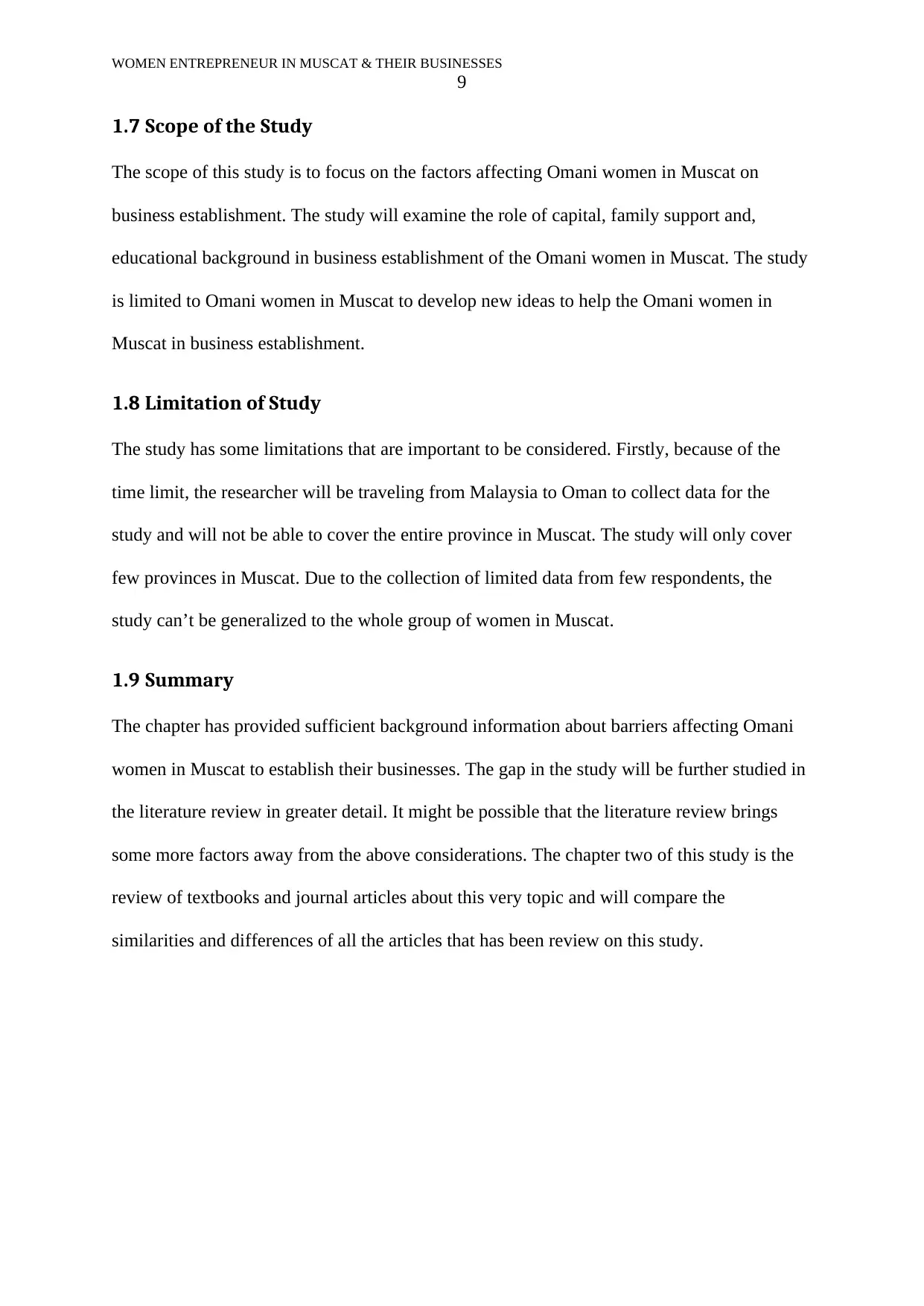
WOMEN ENTREPRENEUR IN MUSCAT & THEIR BUSINESSES
9
1.7 Scope of the Study
The scope of this study is to focus on the factors affecting Omani women in Muscat on
business establishment. The study will examine the role of capital, family support and,
educational background in business establishment of the Omani women in Muscat. The study
is limited to Omani women in Muscat to develop new ideas to help the Omani women in
Muscat in business establishment.
1.8 Limitation of Study
The study has some limitations that are important to be considered. Firstly, because of the
time limit, the researcher will be traveling from Malaysia to Oman to collect data for the
study and will not be able to cover the entire province in Muscat. The study will only cover
few provinces in Muscat. Due to the collection of limited data from few respondents, the
study can’t be generalized to the whole group of women in Muscat.
1.9 Summary
The chapter has provided sufficient background information about barriers affecting Omani
women in Muscat to establish their businesses. The gap in the study will be further studied in
the literature review in greater detail. It might be possible that the literature review brings
some more factors away from the above considerations. The chapter two of this study is the
review of textbooks and journal articles about this very topic and will compare the
similarities and differences of all the articles that has been review on this study.
9
1.7 Scope of the Study
The scope of this study is to focus on the factors affecting Omani women in Muscat on
business establishment. The study will examine the role of capital, family support and,
educational background in business establishment of the Omani women in Muscat. The study
is limited to Omani women in Muscat to develop new ideas to help the Omani women in
Muscat in business establishment.
1.8 Limitation of Study
The study has some limitations that are important to be considered. Firstly, because of the
time limit, the researcher will be traveling from Malaysia to Oman to collect data for the
study and will not be able to cover the entire province in Muscat. The study will only cover
few provinces in Muscat. Due to the collection of limited data from few respondents, the
study can’t be generalized to the whole group of women in Muscat.
1.9 Summary
The chapter has provided sufficient background information about barriers affecting Omani
women in Muscat to establish their businesses. The gap in the study will be further studied in
the literature review in greater detail. It might be possible that the literature review brings
some more factors away from the above considerations. The chapter two of this study is the
review of textbooks and journal articles about this very topic and will compare the
similarities and differences of all the articles that has been review on this study.
Paraphrase This Document
Need a fresh take? Get an instant paraphrase of this document with our AI Paraphraser
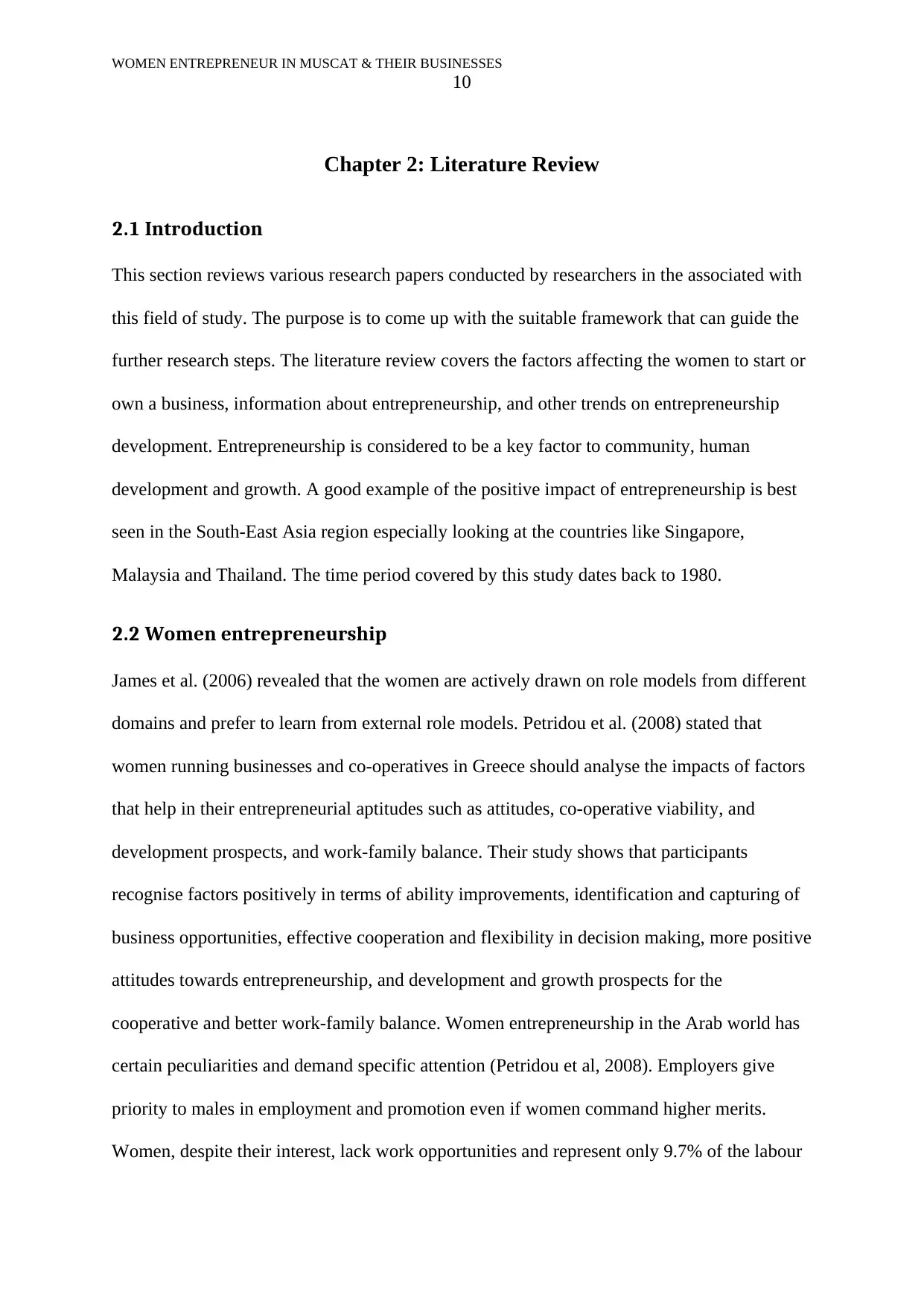
WOMEN ENTREPRENEUR IN MUSCAT & THEIR BUSINESSES
10
Chapter 2: Literature Review
2.1 Introduction
This section reviews various research papers conducted by researchers in the associated with
this field of study. The purpose is to come up with the suitable framework that can guide the
further research steps. The literature review covers the factors affecting the women to start or
own a business, information about entrepreneurship, and other trends on entrepreneurship
development. Entrepreneurship is considered to be a key factor to community, human
development and growth. A good example of the positive impact of entrepreneurship is best
seen in the South-East Asia region especially looking at the countries like Singapore,
Malaysia and Thailand. The time period covered by this study dates back to 1980.
2.2 Women entrepreneurship
James et al. (2006) revealed that the women are actively drawn on role models from different
domains and prefer to learn from external role models. Petridou et al. (2008) stated that
women running businesses and co-operatives in Greece should analyse the impacts of factors
that help in their entrepreneurial aptitudes such as attitudes, co-operative viability, and
development prospects, and work-family balance. Their study shows that participants
recognise factors positively in terms of ability improvements, identification and capturing of
business opportunities, effective cooperation and flexibility in decision making, more positive
attitudes towards entrepreneurship, and development and growth prospects for the
cooperative and better work-family balance. Women entrepreneurship in the Arab world has
certain peculiarities and demand specific attention (Petridou et al, 2008). Employers give
priority to males in employment and promotion even if women command higher merits.
Women, despite their interest, lack work opportunities and represent only 9.7% of the labour
10
Chapter 2: Literature Review
2.1 Introduction
This section reviews various research papers conducted by researchers in the associated with
this field of study. The purpose is to come up with the suitable framework that can guide the
further research steps. The literature review covers the factors affecting the women to start or
own a business, information about entrepreneurship, and other trends on entrepreneurship
development. Entrepreneurship is considered to be a key factor to community, human
development and growth. A good example of the positive impact of entrepreneurship is best
seen in the South-East Asia region especially looking at the countries like Singapore,
Malaysia and Thailand. The time period covered by this study dates back to 1980.
2.2 Women entrepreneurship
James et al. (2006) revealed that the women are actively drawn on role models from different
domains and prefer to learn from external role models. Petridou et al. (2008) stated that
women running businesses and co-operatives in Greece should analyse the impacts of factors
that help in their entrepreneurial aptitudes such as attitudes, co-operative viability, and
development prospects, and work-family balance. Their study shows that participants
recognise factors positively in terms of ability improvements, identification and capturing of
business opportunities, effective cooperation and flexibility in decision making, more positive
attitudes towards entrepreneurship, and development and growth prospects for the
cooperative and better work-family balance. Women entrepreneurship in the Arab world has
certain peculiarities and demand specific attention (Petridou et al, 2008). Employers give
priority to males in employment and promotion even if women command higher merits.
Women, despite their interest, lack work opportunities and represent only 9.7% of the labour
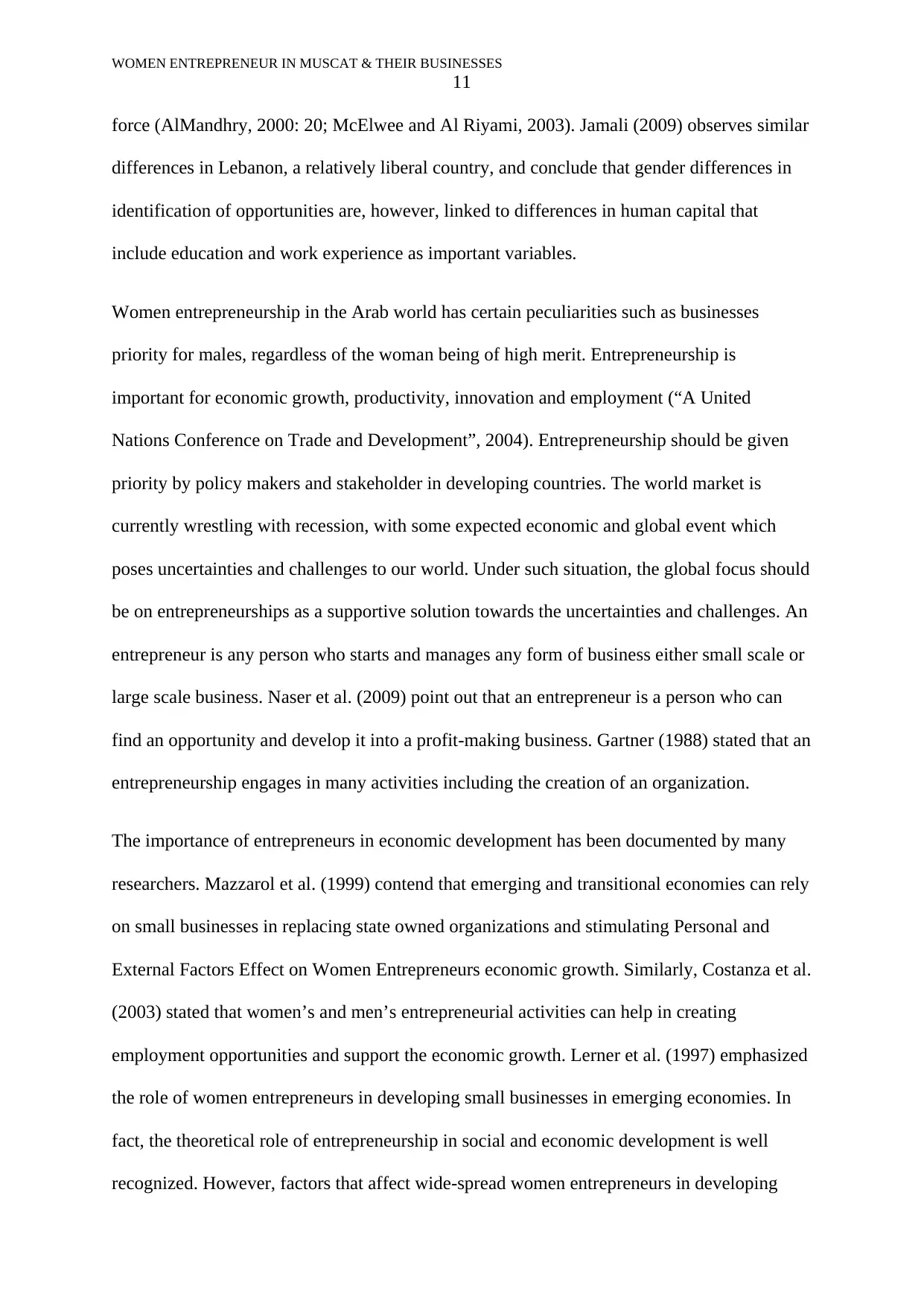
WOMEN ENTREPRENEUR IN MUSCAT & THEIR BUSINESSES
11
force (AlMandhry, 2000: 20; McElwee and Al Riyami, 2003). Jamali (2009) observes similar
differences in Lebanon, a relatively liberal country, and conclude that gender differences in
identification of opportunities are, however, linked to differences in human capital that
include education and work experience as important variables.
Women entrepreneurship in the Arab world has certain peculiarities such as businesses
priority for males, regardless of the woman being of high merit. Entrepreneurship is
important for economic growth, productivity, innovation and employment (“A United
Nations Conference on Trade and Development”, 2004). Entrepreneurship should be given
priority by policy makers and stakeholder in developing countries. The world market is
currently wrestling with recession, with some expected economic and global event which
poses uncertainties and challenges to our world. Under such situation, the global focus should
be on entrepreneurships as a supportive solution towards the uncertainties and challenges. An
entrepreneur is any person who starts and manages any form of business either small scale or
large scale business. Naser et al. (2009) point out that an entrepreneur is a person who can
find an opportunity and develop it into a profit-making business. Gartner (1988) stated that an
entrepreneurship engages in many activities including the creation of an organization.
The importance of entrepreneurs in economic development has been documented by many
researchers. Mazzarol et al. (1999) contend that emerging and transitional economies can rely
on small businesses in replacing state owned organizations and stimulating Personal and
External Factors Effect on Women Entrepreneurs economic growth. Similarly, Costanza et al.
(2003) stated that women’s and men’s entrepreneurial activities can help in creating
employment opportunities and support the economic growth. Lerner et al. (1997) emphasized
the role of women entrepreneurs in developing small businesses in emerging economies. In
fact, the theoretical role of entrepreneurship in social and economic development is well
recognized. However, factors that affect wide-spread women entrepreneurs in developing
11
force (AlMandhry, 2000: 20; McElwee and Al Riyami, 2003). Jamali (2009) observes similar
differences in Lebanon, a relatively liberal country, and conclude that gender differences in
identification of opportunities are, however, linked to differences in human capital that
include education and work experience as important variables.
Women entrepreneurship in the Arab world has certain peculiarities such as businesses
priority for males, regardless of the woman being of high merit. Entrepreneurship is
important for economic growth, productivity, innovation and employment (“A United
Nations Conference on Trade and Development”, 2004). Entrepreneurship should be given
priority by policy makers and stakeholder in developing countries. The world market is
currently wrestling with recession, with some expected economic and global event which
poses uncertainties and challenges to our world. Under such situation, the global focus should
be on entrepreneurships as a supportive solution towards the uncertainties and challenges. An
entrepreneur is any person who starts and manages any form of business either small scale or
large scale business. Naser et al. (2009) point out that an entrepreneur is a person who can
find an opportunity and develop it into a profit-making business. Gartner (1988) stated that an
entrepreneurship engages in many activities including the creation of an organization.
The importance of entrepreneurs in economic development has been documented by many
researchers. Mazzarol et al. (1999) contend that emerging and transitional economies can rely
on small businesses in replacing state owned organizations and stimulating Personal and
External Factors Effect on Women Entrepreneurs economic growth. Similarly, Costanza et al.
(2003) stated that women’s and men’s entrepreneurial activities can help in creating
employment opportunities and support the economic growth. Lerner et al. (1997) emphasized
the role of women entrepreneurs in developing small businesses in emerging economies. In
fact, the theoretical role of entrepreneurship in social and economic development is well
recognized. However, factors that affect wide-spread women entrepreneurs in developing
⊘ This is a preview!⊘
Do you want full access?
Subscribe today to unlock all pages.

Trusted by 1+ million students worldwide
1 out of 33
Related Documents
Your All-in-One AI-Powered Toolkit for Academic Success.
+13062052269
info@desklib.com
Available 24*7 on WhatsApp / Email
![[object Object]](/_next/static/media/star-bottom.7253800d.svg)
Unlock your academic potential
Copyright © 2020–2026 A2Z Services. All Rights Reserved. Developed and managed by ZUCOL.





